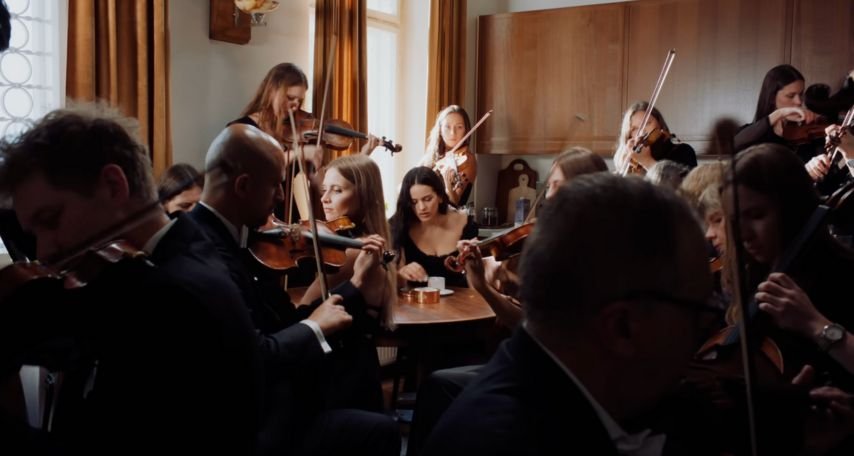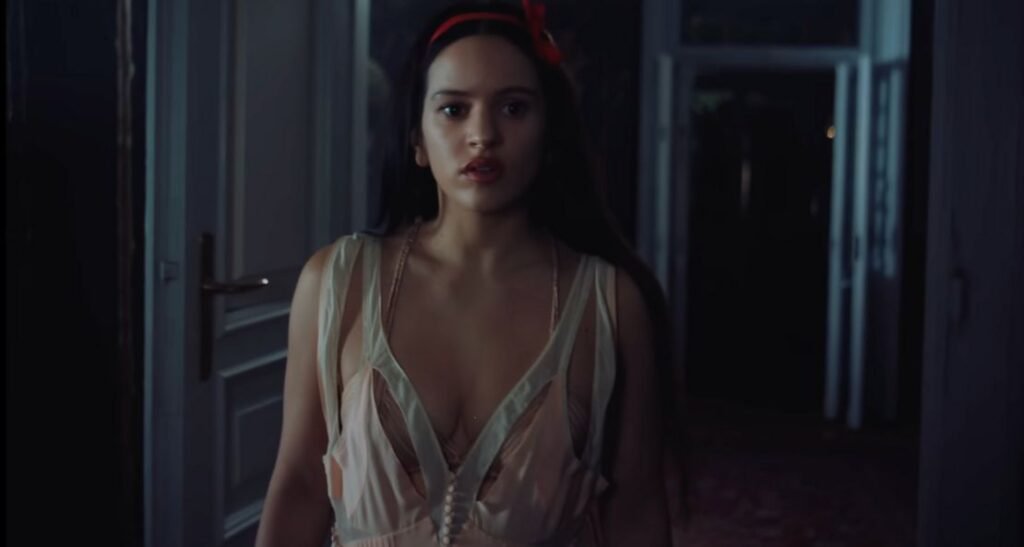Spanish pop auteur ROSALÍA has spent her career dismantling the boundaries between flamenco tradition and experimental pop, but “Berghain” might be her most audacious statement yet.
The lead single from her fourth studio album LUX features Icelandic legend Björk and avant-garde artist Yves Tumor on a tri-lingual, orchestrally charged meditation on love, loss, and mortality. It’s three acts of watching your heart break unfold.
If Motomami fractured pop, LUX consecrates it. Where that album rewired reggaeton and digital chaos into a self-portrait of control, Berghain restores formality through faith and theatre.
It’s Rosalía reclaiming the kind of grandeur pop rarely dares anymore; treating emotion not as a product but as ritual.
Orchestral Obsession
The track opens with German lyrics sung over piano and swelling strings. Production comes from Noah Goldstein, Jake Miller, and Sir Dylan, layering baroque instrumentation with moments of stark intimacy.
Picture carrying a full symphony around whilst just trying to get through your day. That’s the feeling here.

ROSALÍA’s verses shift between German and Spanish, her voice moving from fragile whisper to full-throated declaration.
When she sings “Solo soy un terrón de azúcar / Sé que me funde el calor” (I’m just a sugar cube / I know the heat melts me), there’s no clever wordplay. Just the raw acknowledgment of your own dissolution, simple and devastating.
It’s also where the Rosalia Berghain lyrics meaning becomes clearest: heartbreak reframed as sacred ceremony.
Björk’s contribution arrives like a visitation. Her chorus, delivered in German, transforms the refrain “Seine Angst ist meine Angst / Seine Wut ist meine Wut” (His fear is my fear / His anger is my anger) into something both devotional and dangerous.
She described her involvement on Instagram as watching ROSALÍA “grow” and praised the album’s genre-switching approach as “fierce.” That word captures the controlled chaos of “Berghain” perfectly.
Then Yves Tumor’s outro crashes in with English lyrics that shift the song’s register entirely: “I’ll fuck you till you love me” repeated like a mantra, like a threat, like a prayer.
It’s uncomfortable and confrontational. Spiritual longing collides with physical desperation in a way that makes you squirm, but that discomfort feels entirely necessary.
The orchestral parts were arranged and conducted by Daníel Bjarnason and recorded with the London Symphony Orchestra at Abbey Road Studio 2, adding a physical weight that contrasts the digital intimacy of her earlier work.
Mixing engineer Manny Marroquin reportedly kept Rosalía’s vocals almost dry in sections to preserve that feeling of exposure.
A Jewelled Heart Failing
Lyrically, Berghain behaves like a requiem; each verse a confession, each chorus a form of penance.
The song plays out like a medical tragedy dressed in religious imagery. ROSALÍA positions herself as a patient with a failing heart (described as “la joya”, the jewel), visiting doctors (jewellers) who offer no hope.
That orchestral arrangement shadowing her throughout? It’s the intrusive thoughts, the mounting dread, the soundtrack to your own decline.
Fan discussions and analysis point to the Snow White imagery as deliberate. ROSALÍA wanders through the forest of her despair, lost and waiting for something.
Rescue, death, transformation, whatever comes first. The sugar cube works on multiple levels: sweetness that dissolves under pressure, a life consumed too quickly, pleasure collapsing in the face of pain.
Björk’s “divine intervention” refrain reads less like optimism and more like resignation. When human solutions fail, what’s left? Wait for grace, or as Yves Tumor’s section suggests, demand it through sheer force of will and repetition.
The song’s final bars mirror a heart’s last beats. The orchestra slows, the voice fades, and in ROSALÍA’s telling, her soul rises “like a dove.”
It’s a Catholic ending to a very Catholic piece of art, treating suffering as something worth witnessing in full.
The Visuals: Theatre, Death, and Ascension
The music video for “Berghain” extends the song’s operatic vision into full cinematic spectacle. Filmed in Poland, and directed by Nicolas Méndez, the visual narrative follows ROSALÍA through a series of tableaux that blur the line between fairy tale and religious procession.
The orchestra that haunts the song materialises in the video as a full ensemble that follows ROSALÍA through different everyday scenes.
It’s Snow White meets funeral procession, and the theatricality of it all somehow makes the despair feel more acute rather than ridiculous.
What makes the video work is its commitment to the bit. There’s no knowing wink, no moment where the artifice breaks.
Whether you find it moving or excessive probably depends on how much you’re willing to meet her at that level of intensity.
Sacred Meets Profane
The accompanying imagery and teasers ROSALÍA shared on her Substack showed sheet music for piano and voice with the title “BERGHAIN” in capitals.
An early hint at the song’s classical ambitions. The aesthetic throughout the LUX campaign has leaned heavily into Christian iconography, not as conservative statement but as elevation. ROSALÍA treats pop music like it deserves stained glass windows.
In doing so, she joins a lineage of avant-pop architects, from Björk’s Homogenic to FKA twigs’ MAGDALENE, who blur the lines between worship and desire.
Yet Rosalía’s interpretation feels uniquely Iberian, steeped in Catholic imagery where beauty and suffering are inseparable.
Berghain is also the name of Berlin’s most notorious techno club, known for its hedonistic atmosphere and brutal door policy.
The juxtaposition feels entirely intentional. ROSALÍA has always understood that worship and desire aren’t as separate as we pretend.
What People Are Saying
Since its release, “Berghain” has sparked intense discussion across music forums and reaction videos.
Listeners on Reddit’s popheads community have praised the song’s theatrical ambition whilst debating its accessibility. This isn’t something you half-listen to whilst doing the washing up.
Critics have noted the song’s place within ROSALÍA’s evolution from the flamenco-fusion of El Mal Querer through the experimental pop of Motomami to LUX‘s more explicitly art-music aspirations.
Where previous work felt like genre exercises (what happens when you apply reggaeton to heartbreak?), “Berghain” abandons genre altogether.
The collaboration feels significant too. Björk and Yves Tumor aren’t just featured artists; they’re co-conspirators.
Each brings their own relationship to blurred boundaries. Björk between human and natural world, Yves Tumor between masculine and feminine, rock and R&B. Together with ROSALÍA, they’ve created something genuinely strange.
Critics have drawn parallels between Berghain and the grandiosity of Kate Bush’s Hounds of Love, noting how Rosalía harnesses orchestral form not as nostalgia but rebellion.
On social media, fans have dubbed it “opera-pop for the algorithm age,” admiring how it rejects instant gratification.
Why It Works (Or Doesn’t)
“Berghain” won’t be everyone’s idea of a good time. Too slow for the club that shares its name, too dramatic for casual listening, too weird for radio.
But that’s precisely what makes it remarkable. ROSALÍA has reached a point where she can pack an orchestra into a metaphorical truck, sing in three languages, cast Björk as a divine messenger, and let Yves Tumor close with profane repetition. Somehow it all coheres.
The song succeeds because it takes its own emotions seriously. No winking irony, no hedging bets. If you’re going to make a song about dying from heartbreak, why not go full opera?
That commitment to extremity separates ROSALÍA from her peers. Whether “Berghain” is a masterpiece or a fascinating mess probably depends on your tolerance for theatrical excess, but there’s something admirable about an artist treating a broken heart like the end of the world.
Because sometimes it is.
“Berghain” is available now on all streaming platforms. LUX (Versión Física) is out 7 November 2025 via Columbia Records.
You might also like:
- Gracie Abrams I Love You, I’m Sorry Lyrics Explained: From Heartbreak to Healing
- Ariana Grande’s Hampstead Lyrics and Meaning: A Beautifully Bitter Walk Through Emotional Backstreets
- JENNIE & Doechii’s ExtraL Lyrics Meaning and Review
- Last Heartbreak Song by Ayra Starr ft. GIVEON: A Heartrending Serenade
- Lana Del Rey’s Chemtrails Over the Country Club: Lyrics, Meaning, and Analysis
- 35 Timeless Spanish Love Songs You Should Listen To Now


